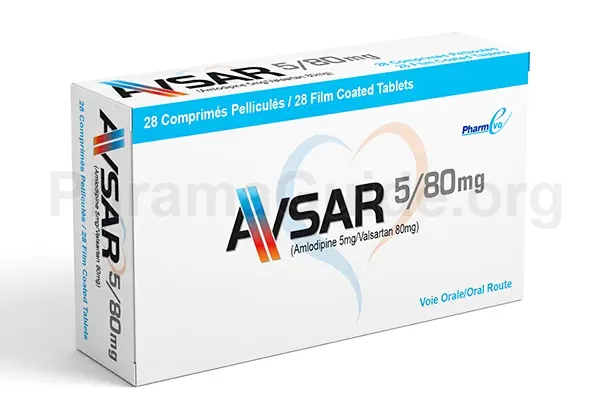Avsar tablet is primarily used for the treatment of high blood pressure (hypertension). It is a combination of CCB (calcium channel blockers.) and ARB (angiotensin II receptor blocker), that offers the benefits of two different classes of antihypertensive drugs working together to lower blood pressure. Following are some approved and off-label uses of Avsar Tablet:
Approved Uses of Avsar Tablet
- Hypertension: Avsar tablets are commonly used to treat hypertension. It blocks the hormones that cause blood vessels to constrict secondly, it helps relax and widen the blood vessels, allowing for smoother blood flow and reducing blood pressure. Avsar helps lower blood pressure more effectively than using either medication alone.
- Management of Uncontrolled Hypertension: Avsar tablet is often used in cases of uncontrolled hypertension, where blood pressure remains elevated despite treatment with conventional antihypertensive medication.
- Reduction of Cardiovascular Risk: Lowering blood pressure is crucial for reducing the risk of cardiovascular events, such as heart attacks, strokes, and heart failure. The use of Avsar helps to effectively reduce blood pressure which helps in reducing overall cardiovascular risk.
Off-label Uses of Avsar Tablet
- Heart Failure: Avsar tablets may be beneficial in managing heart failure, especially when the heart’s pumping function is reduced.
- Diabetic Nephropathy: Avsar tablet may be used off-label in managing kidney disease associated with diabetes (diabetic nephropathy), especially in those with hypertension.
- Pulmonary Hypertension: Avsar tablet can used for the treatment of pulmonary hypertension.

What is Avsar?
Avsar is one of the leading brands with a combination of Amlodipine + Valsartan, manufactured and marketed by Pharmevo Pakistan (Pvt) Ltd.
Avsar Alternatives : Other Similar Brands
Below are some available similar brands that can be used as an alternative to Avsar:
- Extor : Searle Pakistan (Pvt) Ltd.
- Amstan : Scilife Pharmaceuticals (Pvt) Ltd. Pakistan
- Avcard : Hilton Pharmaceuticals (Pvt) Ltd. Pakistan
- Avsar : Pharmevo Pakistan (Pvt) Ltd.
- Av-Sartan : Barrett Hodgson Pakistan (Pvt) Ltd.
- Biforge : Highnoon Laboratories (Pvt) Ltd. Pakistan
- Caloc-V : Bosch Pharmaceuticals (Pvt) Ltd. Pakistan
- Covam : Getz Pharmaceuticals (Pvt) Ltd. Pakistan
- Covance : Ferozsons Laboratories (Pvt) Ltd.
- Doetor : Martin Dow Pharmaceuticals (Pvt) Ltd.
- Exforge : Novartis Pharma (Pvt) Ltd.
Avsar : Available Formulations and Strengths
Presently, Avsar is available in Tablet Form with the following strengths.
- Avsar Tablet 10/160: Amlodipine 10mg + Valsartan 160mg strengths
- Avsar Tablet 5/80: Amlodipine 5mg + Valsartan 80mg strengths
- Avsar Tablet 5/160: Amlodipine 5mg + Valsartan 160mg strengths
Who Should Not Use Avsar?
Despite the potential benefits of Avsar uses discussed above, there are several contraindications that must be taken into consideration before beginning a course of treatment:
Hypersensitivity or allergic reaction: Avsar is contraindicated in individuals who have a known hypersensitivity or allergic reaction to amlodipine, valsartan, or any other components of the medication.
History of angioedema: Avsar should be avoided in individuals with a history of angioedema, a condition characterized by swelling of the deep layers of the skin, subcutaneous tissues, or mucous membranes. The use of Avsar may increase the risk of recurrent angioedema.
Severe hepatic impairment: Avsar is contraindicated in individuals with severe hepatic impairment, as the medication’s safety and effectiveness in this population have not been established. Close monitoring of liver function is necessary for individuals with hepatic impairment.
Pregnancy: Avsar should not be used during pregnancy. Both medications have the potential to cause harm to the developing fetus, especially when used during the second and third trimesters. Alternative antihypertensive medications should be considered for pregnant individuals.
Breastfeeding: Avsar is excreted in breast milk. It is not recommended to use Avsar while breastfeeding. Consultation with a healthcare professional is necessary to discuss alternative treatment options during breastfeeding.
Renal artery stenosis: Avsar is contraindicated in individuals with bilateral renal artery stenosis or stenosis of the artery to a single functioning kidney. Use of this medication in these cases may lead to a decline in renal function.
What is the Recommended Daily Dosage of Avsar?
Amlodipine Dose for Hypertension:
- Starting Dose: One tablet of 5/80mg once daily
- However, the dose can be adjusted based on the individual’s blood pressure response.
- The maximum recommended dose is two tablets of 5/160mg per day.
How Avsar Works?
Avsar is a combination of amlodipine and valsartan and consists of two different types of medications with distinct modes of action that work together to lower blood pressure.
- Amlodipine: It belongs to a class of medications called calcium channel blockers. Amlodipine works by blocking the entry of calcium ions into the smooth muscle cells of the blood vessels and heart. By inhibiting the influx of calcium, amlodipine relaxes and widens the blood vessels, reducing peripheral resistance and allowing for smoother blood flow. This vasodilation lowers blood pressure and eases the workload on the heart, making it an effective antihypertensive agent.
- Valsartan: It is an angiotensin II receptor blocker (ARB). Valsartan works by selectively blocking the action of angiotensin II, a hormone that causes blood vessels to constrict. Angiotensin II also stimulates the release of aldosterone, a hormone that promotes water and sodium retention, leading to increased blood volume. By blocking the angiotensin II receptor, valsartan relaxes and dilates blood vessels, reduces aldosterone secretion, and helps lower blood pressure.

Leave A Comment